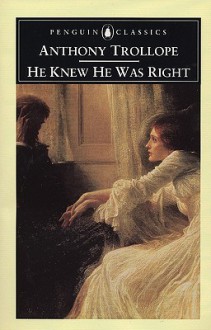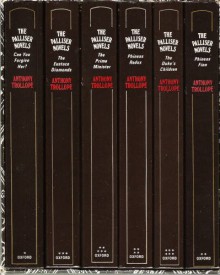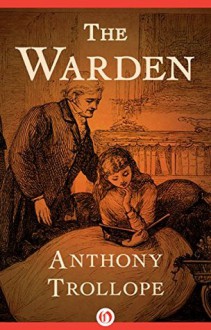
I had fallen in love with Trollope's writing with his 'Chronicles of Barsetshire', particularly 'Barchester Towers' which had all of the social comedy I wanted from a period novel and a broader portrait of life in England in the mid-19th century. Trollope wore his prejudices proudly and his biases were as informative for me as a historian as any impartial work of the era could have been. As I read further into the series I was impressed further with the depth of his characters, particularly his occasional nuanced characterization of women in his era. There were always one or two at least who were rewarded even for bucking the conventions of society, and even those who were caricatures of female vanity or shrewish are excused by the narrator, because of the narrow confines they as women must inhabit to avoid ridicule.
I was talking about this to a customer, perhaps about a year ago, who asked if I had read 'He Knew He Was Right." I said I hadn't and she said she'd be very interested in hearing what I had to say about it. Well, a year or so later I've finished it and I'm not sure what to say.
The central plot is the deterioration of the marriage of Louis and Emily Trevelyon. They are a happy, prosperous couple with a healthy young boy when Louis has a seed of doubt about Emily being visited so often by an old friend of her father's, a man with a lingering rakish reputation despite his age. Louis tries to maneuver Emily away from this acquaintance, and even orders it to stop, but her resistance to the suggestion and scorn at the order - obeying it only to the letter - leads to open distrust and eventual separation.
This disagreement and refusal to compromise ruins both of their lives and almost certainly the life of their son. Houses are given up, scandal is spread through London and wherever either Trevelyon or his wife go. Emily's stubborness rests much on her pride and her Victorian refusal to even touch on the subject of impropriety in conversation until its too late. Trevelyon's insistence becomes more and more adamant and leads to madness. Tied into this mess are Emily's sister Nora, who must make her own decisions about love in the shadow of the terrible example of her sister and brother-in-law, and their whole family who must endeavor to fix this situation or make the best of it.
Nora's two beaus are Charles Glascock and Hugh Stanpole, the former the heir to a peerage and grand estate, the latter a gentleman who makes comparatively thin means writing for a radical newspaper. Each of these gentlemen connect the Trevelyon's marriage plot to happier plots involving young ladies making happy marriages. Hugh's sister Dorothy in going to live with a wealthy maiden aunt inhabits practically her own novel full of botched proposals, village gossip, and just desserts.
There is a lot going on in this lengthy book and it is full of the period detail and social commentary I adore from Trollope, but plot-wise it runs out steam about halfway through. The rift between the Trevelyons is intractable and ends up covering the same ground repeatedly. The marriage plots of Nora and Dorothy are finalized so quickly there is little to do but wait for the wedding, which, on the page, isn't as compelling as you'd like. Other marriages and character arcs are also wrapped up while the reader still has hundreds of pages to go to hear the same loops of conversations and social necessities pass by.
It frankly baffled me. Trollope has never stinted on words in the novels I've read, but there was never this feeling that much of it was so...unnecessary. In doing some reading I found a reference to the novel in Trollope's 'Autobiography' that shows that Trollope was disappointed in the novel:
"I do not know that in any literary effort I ever fell more completely short of my own intention than in this story. It was my purpose to create sympathy for the unfortunate man who, while endeavouring to do his duty to all around him, should be led constantly astray by his unwillingness to submit his own judgment to the opinion of others. The man is made to be unfortunate enough, and the evil which he does is apparent. So far I did not fail, but the sympathy has not been created yet. I look upon the story as being nearly altogether bad. It is in part redeemed by certain scenes in the house and vicinity of an old maid in Exeter. But a novel which in its main parts is bad cannot, in truth, be redeemed by the vitality of subordinate characters."
I appreciate his honesty there. I would go further than saying it is only sympathy for Trevelyon that is lacking. This novel tries to tackle a heavy issue and doesn't quite manage it. Trollope didn't have the vocabulary to dismantle the toxic masculinity that led Trevelyon to becoming unhinged in the way he did. There are some other commentaries about women that I read as thin satire, but was still distasteful to read. Without the fun or interest of other subplots to shore up the devastating weight of the central arc, I would have been unable to finish this novel if I hadn't read 80% in airport terminals last week. I will read more Trollope, but I don't think I can recommend this one to anyone except diehard fans.

 Log in with Facebook
Log in with Facebook 







